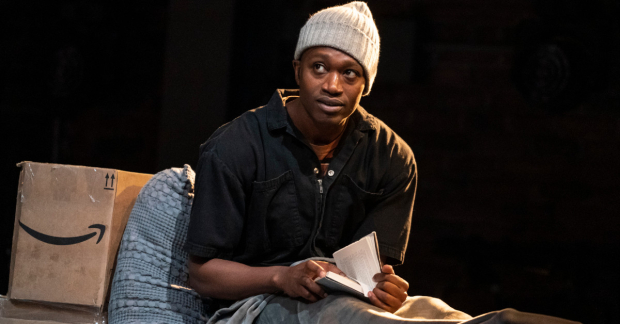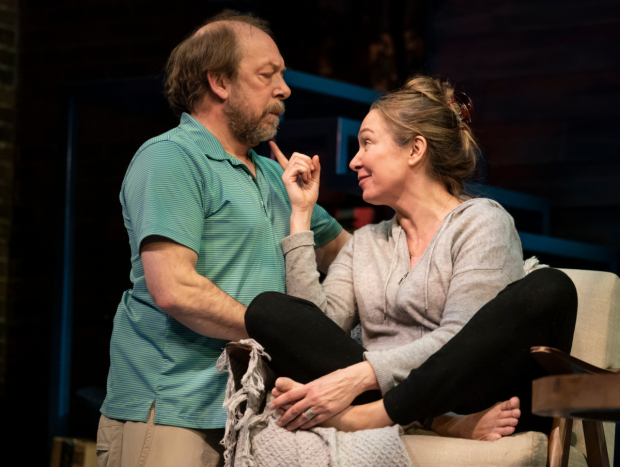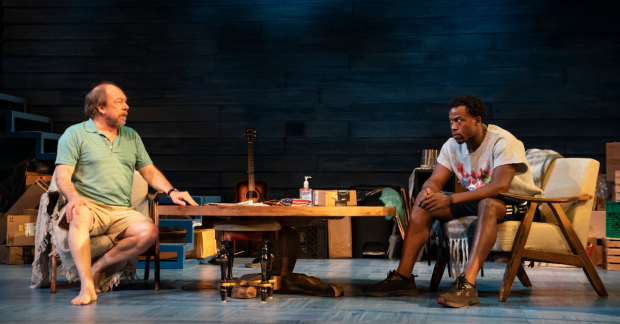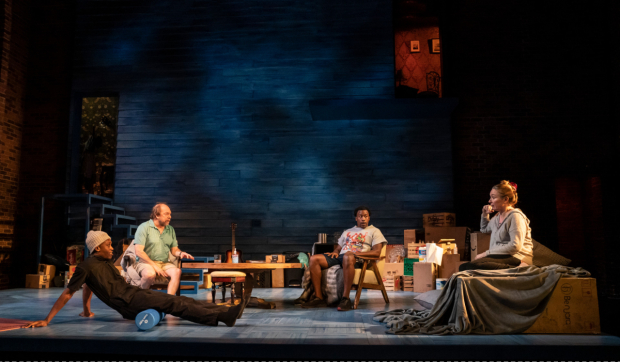Review: Mourning Becomes America in a New Production of O'Neill's Long Day's Journey Into Night
Robert O’Hara directs a stunning revival of O’Neill’s play of guilt and addiction at the Minetta Lane Theatre.

(© Joan Marcus)
Long Day's Journey Into Night is Eugene O'Neill's most personal play, and it's one that he deliberately left unpublished during his lifetime. In it, he summons the ghosts of his own family in the guise of the Tyrones, and with brutal honesty he reveals his father's professional failures, his mother's morphine addiction, his brother's alcoholism, and his own battle with tuberculosis. So intimate were the revelations, that he stipulated the play not be published until 25 years after his death; his wife Carlotta waited three.
Since then, Long Day's Journey has had many major productions, including one on Broadway in 2016 starring Gabriel Byrne and Jessica Lange, who won a Tony for her portrayal of Mary. But other than its status as a classic American drama and its grab-the-popcorn portrayal of a family at war with itself, what more does the play have to say?

(© Joan Marcus)
It turns out, a lot. Director Robert O'Hara has envisioned something very fresh and inspired in Audible's production at the Minetta Lane Theatre in Greenwich Village. It's no exaggeration to say that this production of Long Day's Journey Into Night is a stroke of genius, and it really must be seen to appreciate how startlingly well it works. This intermission-less, two-hour version (the play usually runs closer to four) is set in 2020 rather than the play's original 1912. The words are all O'Neill's, and the essential elements of the plot remain intact (a minor character, the maid Cathleen, has been cut). O'Hara and his creative team have transformed this highly personal play of familial strife into something quite new. From the Covid pandemic and its accompanying mental health issues, to the opioid crisis fueled by the Sackler family and Perdue Pharma, to racial health-care inequalities, the Tyrones become the embodiment of America's present dysfunction — its rancor, selfishness, and bickering all tearing the country to shreds. And no, it does not end happily.
As we enter the theater, we hear waves crashing (sound design by Palmer Hefferan) and see the Tyrone's summer house (set design by Clint Ramos), where the family is staying while the Covid virus spreads through America in the months before the 2020 election. A large sitting room, with small glimpses of two upstairs rooms, is littered with evidence of Covid overstocking — boxes of masks, Amazon packages, a pump bottle of hand sanitizer standing guard in the middle of a large table. Projected on the wall of the room are images of CNN broadcasts (projections by Yee Eun Nam) with chyrons stating news about the current number of Covid deaths, the shooting of Jacob Blake, Trump's falling poll numbers. The Tyrones, we can safely assume, are not anti-vaxxers.

(© Joan Marcus)
James Tyrone (Bill Camp) has a lot to be anxious about at the beginning of what will be a very long day. His wife, Mary (Elizabeth Marvel), dressed in casual Covid-wear (costume design also by Ramos), has recently returned from rehab, but now she's concerned about the health of her bookish son, Edmund (Ato Blankson-Wood), who has come down with a severe respiratory illness. Though she denies it's anything serious, the stress has lured her back into the foggy, painless world of narcotics. Her other son, Jaime (Jason Bowen), a ne'er-do-well boozer, knows high when he sees it, and he's the first to realize early on that his mother is using again, all before 9am.
Things don't get better from there. Over the course of the day, the sky darkens (haunting lighting by Alex Jainchill), the liquor flows like the river Jordan, and the Tyrone men dredge up old beefs, each trying to blame the other for the family's misery as well as for Mary's addiction: James is a cheapskate who hired a quack that got Mary hooked on opioids and who will likely send Edmund to some cheap health-care facility too; Jamie is a bum who was always a disappointment to the family; and Edmund is guilty, well, of being born. As the day grows darker and the symbolic fog begins to roll in off the sea, the Tyrone men, plastered with drink, witness Mary, a ghost of herself, mourning the loss of her girlhood dreams, which she gave up when she first met James and fell in love.

(© Joan Marcus)
In lesser hands, Long Day's Journey Into Night can be very long. But this quartet of actors has turned what could be a dramatic dirge into captivating theater. Marvel and Blankson-Wood bring tears to the eyes in a moving mother-son scene between Mary and Edmund, and Bowen gives a breathtaking performance as Jamie in his ferocious sparring matches with Camp's James. With a cast like this, you don't need special effects. But there are some mood-breaking projections during Mary's shooting-up scenes (one of a skeleton, another of a specterlike apparition) to indicate, presumably, her return to the land of the living dead. The effect is more a distraction than a complement to the performance.
In all other respects though, this production feels like a revelation. It would be going too far to suggest prescience on O'Neill's part, yet there is an uncanniness to the play now as we watch his words fit so snugly into our present. This revival is one of the most significant productions of Long Day's Journey Into Night to date, and it could not be better timed.











